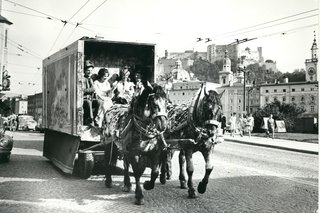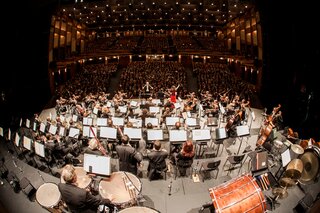
History of the Salzburger Kulturvereinigung
Success Story Salzburger Kulturvereinigung
In the course of its long history, the Salzburger Kulturvereinigung has established itself as the leading concert organiser in the city of Mozart. It presents renowned local and international orchestras, conductors and artists as well as up-and-coming young names of the classical music world to the Salzburg audience. Through its year-round work, the Salzburger Kulturvereinigung is responsible for a considerable part of the city's symphonic music life and is the only organisation to invite international orchestras to the main venue of the Salzburg Festival - the Grosses Festspielhaus - even outside festival times.
The Salzburger Kulturvereinigung combines three central themes under one roof: it organises Concerts, the Salzburger Strassentheater und leitet die Georg Trakl Museum.
In the 2022/23 season, the Salzburger Kulturvereinigung celebrated its "75th anniversary".
Since the 2025/26 season, the programme bears the signature of Benjamin Schmid, Artistic Director of the Salzburger Kulturvereinigung.
The concert season includes a cycle of 9 subscription concerts in the Grosses Festspielhaus, the Salzburger Kulturtage - The Music Festival in autumn at various venues, the Faschingsmatinee and -soiree and the concerts at the turn of the year with the Sylvestergala and New Year's concerts in the Grosses Festspielhaus.
The concerts, the heart of the Salzburger Kulturvereinigung, will be strengthened by additional music education formats. With this, the Kulturvereinigung would like to cordially invite all concert-goers, whether young, old, new or experienced, to engage with music outside the concert hall. Freely according to the motto: curiously immerse yourself in the material or even dive deeper.
In order to continue to make the concert hall more attractive for young visitors, the Salzburger Kulturvereinigung not only organises the annual student and apprentice concerts in the Grosses Festspielhaus, which are received with great success. From now on, first-class concert tickets are available for everyone under 27 years of age at € 15 in the best category still available.
The Salzburger Kulturtage open up to other genres and music formats in addition to classical music. Seen in this light, the music festival in the fall stands for diversity: musically, artistically and humanly. The venues used include the Grosses Festspielhaus, the Felsenreitschule, the Haus für Mozart, the Great Hall of the Mozarteum Foundation and Salzburg Cathedral.
The program at the turn of the year focuses on tradition: On New Year's Eve, two New Year's Eve galas are on the program. On January 1, the Salzburger Kulturvereinigung organizes New Year's concerts in the Grosses Festspielhaus.
The administration and ticket office of the Salzburger Kulturvereinigung are located in the birthplace of the Salzburg poet Georg Trakl on Waagplatz. Here the Salzburger Kulturvereinigung also maintains the Georg Trakl Research and Memorial Center.
With the Salzburg Street Theater, the Salzburger Kulturvereinigung facilitates quality, modern theater with first-class actors on the squares and streets in the city and province of Salzburg with free admission. In 2019, a world premiere was given for the first time in the history of Salzburg street theater. In the summer of 2020, there were 50 years of Salzburg Street Theater to celebrate.
As a supporting member, you can directly support the Salzburger Kulturvereinigung commitment to youth and young talent work and help realize a wide variety of projects. In return, you will enjoy attractive benefits as a Red/Silver/Gold Card holder. You can find more information here.
Pioneering Work and Cultural Events Outside the Festival Season
According to the original mission of the Salzburger Kulturvereinigung, the population of Salzburg should benefit from a lively cultural environment at affordable prices throughout the year. In the post-war years, great pioneering work had to be done for the cultural diversity that we can experience in Salzburg today and that makes our city so unique. As the first tenant in the Festspielhaus, the Salzburger Kulturvereinigung organised subscription concerts for the first time from 1951 onwards, later initiated the Salzburg Street Theatre (Salzburger Straßentheater) during the festival season and provided the population with a varied exhibition, lecture and course programme from the very beginning. Today the Kulturvereinigung has established itself as Salzburg's leading concert organizer.
From the archive:
Post-War Education and Salzburg's First Theatre and Concert Subscriptions
The history of the Salzburger Kulturvereinigung has been closely linked to the Festspielhaus since its foundation in 1947. The founding statutes deliberately advocated "the promotion of the Salzburg Festival, the theatres run by public corporations, the Salzburg concert life [...]". These ideals had to be met, and in addition to the educational activities of the Salzburger Kulturvereinigung, including various courses and a school-leaving examination for young people returning home from war, the Theaterring, which had existed since 1950, was to be further expanded in cooperation with the Landestheater. To this end, the presidium engaged the then 24-year-old Heinz Erich Klier in 1951, who had worked for the Salzburger Kulturvereinigung before - it was to become his lifelong task! - He was also the director of the ticket office of the Salzburg Festival. Klier knew how to seize this opportunity: within one season, he doubled the number of Theaterring subscribers and shortly afterward he laid the foundation stone for the concert ring, which is so successful today. It began in 1952, first in the Great Aula of the University. Two years later they ventured into the Small Festspielhaus. As early as 1957, the concert cycle was moved to the old Grosses Festspielhaus, which was reopened in 1960 according to the plans of Clemens Holzmeister. Hardly anyone would have thought at that time that someone would be able to fill the Festspielhaus outside of the festival. However, the subscription concerts had an enormous pull on the Salzburg population and were always sold out. Here you could see and hear the Vienna Philharmonic conducted by Aram Katchaturian, the Moscow Philharmonic with solo violinist David Oistrach or the Vienna Symphony conducted by Eduard Strauss. From the 1963/64 season onwards, an additional concert series had to be offered in the Small Festspielhaus, as there were no more subscriptions for the series in the Large Festspielhaus.
The concert series found a large and loyal circle of subscribers, who today number around 5,000 permanent visitors. In addition, there is the great success of the New Year's concerts in the Grosses Festspielhaus, which have been held since 1997. The two-week music festival "Salzburger Kulturtage", which was founded in 1972 as a kind of "musical season extension" in autumn and promptly received the nickname "Festspiele für jedermann" (Festival for Everyone), also played a special role. Here the Salzburgers came together for concerts and opera performances - artists as well as audiences, mixed with an international clientele who knew how to enjoy the golden Autumn in Salzburg.
Street Theatre for the People of Salzburg
It was the festival director Oscar Fritz Schuh who, together with his wife Ursula, had the idea of a fairground theatre with free admission. In 1970 his vision was finally accepted by the Salzburger Kulturvereinigung that then became its future sponsor. The subsidy providers: city, state, and federal government, saw this as a suitable opportunity to present the street theatre as a kind of "opening of the festival" for the population of Salzburg. The Stiegl brewery provided the two magnificent horses and coachmen and donated a beer wagon to the Kulturvereinigung. This beer wagon was converted into a theatre wagon by the Salzburg Festival. Schuh remained faithful to the street theatre until his death in 1984, after which director Klaus Gmeiner held the reins for 30 years before the director and actor Georg Clementi took over the direction of the street theatre in 2016.
Fell Out of Time: Lectures With Colour Photographs
In addition to the theatre and concert sectors, the Kulturvereinigung devoted itself to education and organised popular science colour slide lectures, to which thousands of people from all over the region made pilgrimages, especially in the 1950s and 1960s. At a time when information was not as easily accessible as it is today, lectures by Heinrich Harrer on "7 Years in Tibet", Dr. Hans Hass on the "Great Animal World of the Sea" or lectures on Africa regularly blew up the capacity of the Great University Auditorium.
The Legacy of Georg Trakl - Salzburg's Internationally Most Famous Poet
A further responsible task awaited the Salzburger Kulturvereinigung in 1973 when the province of Salzburg took care of the Trakl memorial in the poet's birthplace, which had been newly created with the help of the Kulturvereinigung. Since 1973, the curator and director Dr. Hans Weichselbaum has constantly expanded and filled the memorial with life. The most important addition was the acquisition of the Trakl estate from Erhard Buschbeck, a school friend of Trakl (1978). It was supplemented by a donation from Prof. Lotte Tobisch-Labotyn in 2008. In 1987, on the occasion of the 100th birthday of Georg Trakl, the memorial was spatially expanded into a research and memorial site. Today the Geor Trakl research and memorial site has a considerable collection of manuscripts, documents, publications, and photographs as well as a film portrait, and is accessible to visitors daily.
From Pioneer to Salzburg's Leading Concert Organizer
In the course of its 70-year history, the Salzburger Kulturvereinigung has established itself as the leading concert organizer in the city of Mozart. Today it is responsible for a large part of the symphonic musical life of the city and invites internationally renowned orchestras to the main venue of the Salzburg Festival even outside festival season. In a long-standing partnership with the Mozarteum Orchestra Salzburg, more than 900 concerts have been organized. The Salzburgers also know the Kulturvereinigung as the organiser of the Salzburg Street Theatre, which has been stopping at around 40 venues in the city and province of Salzburg every summer since 1970 with its theatre car and offers high-quality theatre with free admission. In addition, the Kulturvereinigung has been operating the Georg Trakl Research and Memorial Site (Georg Trakl Museum) since 1973 and conveys the literary heritage of Salzburg's internationally most famous poet in this museum and in numerous events. The ticket office of the Salzburger Kulturvereinigung is also located here in the historic Trakl House.
Facts & Figures
The Salzburger Kulturvereinigung was founded in 1947.
Dr. Heinz Erich Klier was Secretary General from 1951 to 2009 and was active as Vice President until his death.
In 1950 the first theatre subscriptions (Theaterring) are offered by the Kulturvereinigung in cooperation with the Landestheater.
1952 the Kulturvereinigung becomes the first tenant in the Festspielhaus and organises the very first subscription concerts there in Salzburg.
1962 Dr. Heinz Erich Klier and Prof. Gustav Gruber founded the Orchestra of the Salzburger Kulturvereinigung.
Following an idea by Prof. Oscar Fritz Schuh, the Salzburger Strassentheater was founded in 1970 and is still successful today.
In 1972 - the year of the 25th anniversary of the Salzburger Kulturvereinigung - Dr. Klier founded the "Salzburger Kulturtage", which still have a firm place in the cultural life of the Mozart city today.
In 1973, after years of preparation, a research and memorial site was established in the renovated birthplace of Georg Trakl.
Since 1997, the New Year concerts have been breaking annual records, and the unrestrained demand has made it necessary to expand to two New Year concerts for the first time in 2011 and even to three New Year concerts in one day in 2013.
In 2009 Elisabeth Fuchs took over the artistic direction and thus the entire programme planning. Together with her, Josefa Hüttenbrenner, as commercial director, took up the challenge of positioning the company as a non-profit organisation in a contemporary way.
In November 2012 Hans Schinwald was elected as the new president of the Salzburger Kulturvereinigung.
In 2016 the director and actor Georg Clementi becomes the new artistic director of the Salzburg Street Theatre.
In October 2017, the Salzburger Kulturvereinigung celebrates its 70th anniversary with a ceremony in the Residenz and a subsequent concert with the Mozarteum Orchestra Salzburg in the Grosses Festspielhaus.
Thomas Heißbauer has been the new artistic director of the Salzburger Kulturvereinigung since October 2018.
In October 2023, the Salzburger Kulturvereinigung celebrates its 70th anniversary with a ceremony in the Residenz.

